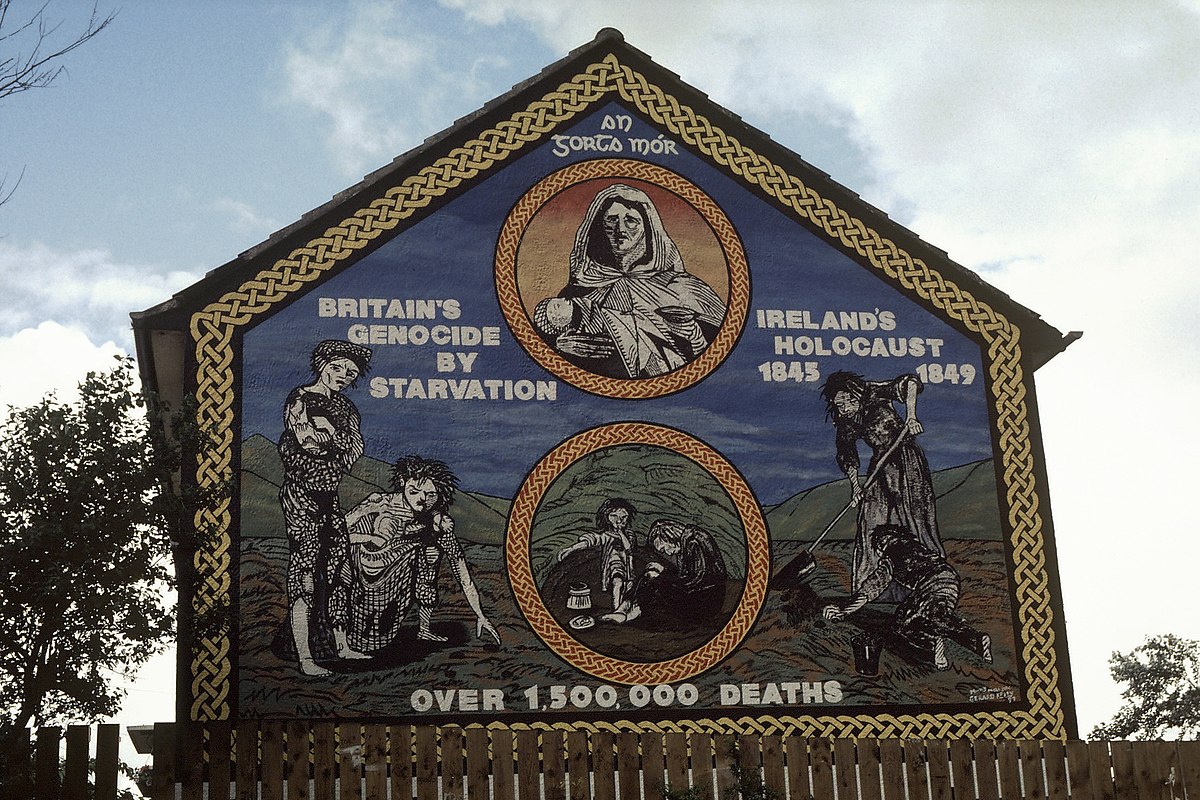“When the Hunger Was Upon Us” provides a history of the economic inequality in Ireland that led to the Irish Famine and mass migration to the United States. As with Hurricane Katrina, this was not simply a “natural disaster” but instead had its roots in the distribution of land and the focus on profit over people. Author Nigel Gray sent us this poem when he saw the article by Zinn Education Project co-director Bill Bigelow called The Real Irish American Story Not Taught in Schools. This poem can be used to introduce students to the real history left out of the textbooks and to the role play Hunger on Trial: An Activity on the Irish Potato Famine and Its Meaning for Today.
When the Hunger Was Upon Us
We owned less than fourteen per cent
of our own land.
We were not allowed to:
vote;
teach;
bear arms;
own a horse worth five pounds;
buy land or farms.
The English
prohibited the export of our woollen goods:
destroyed our industry to protect their trade.
Rents were sent to absentee landlords
and spent in London.
Our country bled,
while English gluttons grew florid,
as port, the colour of blood, flowed freely
in the big town mansions
and the manor houses on country estates.
Bumper crops of wheat, oats and barley,
vegetables, butter and bacon,
were taken by the landlord for rent.
We survived on potatoes
until the blight.
Stalks stayed green,
but leaves turned as black as sin.
Our crop was a stinking and slimy
black mass of corruption.
When the hunger was upon us
clergy and gentry ate their fill
while we scavenged for berries and roots,
cabbage leaves and kelp,
nettles and weeds,
till our land was as barren
as if a plague of locusts
had passed this way.
Our scarecrow children,
lay like sacks of sticks
scattered on a sprinkling of straw
and let go of life without a murmur;
or died at the roadside,
their mouths stained green
from chewing grass,
their bodies, no more than parchment-covered bones,
half eaten by rats and starving dogs.
Though they were leaf-light,
we were too weak to bury them
beneath even a handful of stones.
Landlords sent hired men
to fire the thatch above our heads
and tumble our walls with crowbars.
We clutched at coats and cooking pots,
clung to door posts
from which we were torn
like lice plucked from the groin.
Our little ones
clawed our breasts and brains
with cries of hunger, fear and pain.
Dragoons drove us from the ruins of our holdings,
from land we had reclaimed from bog
with hand and spade.
They tore up our foundations
to make way for sheep and cattle
which brought a better profit.
For resisting,
our backs were flayed
into raw red meat,
or we were hung in rows,
like carcasses on a butcher’s rail.
We scraped holes in hillsides.
The tools of our new trades:
fingers to form begging bowls;
fingernails for rooting,
like hogs, in the clay.
And in the peat bog,
we trailed across the
unmarked graves of soldiers,
who marched into no one else’s land,
who tried to take nothing
but what belonged to them,
whose names are not recorded.
To politician, priest and landlord,
famine was the will of God.
A natural calamity.
Social structure would collapse,
they said,
if they gave free food.
So soldiers patrolled the cornfields,
and warships escorted wheat ships
from our ports.
When our country
became too ragged for even
a beggar’s coat,
we emigrated
or were emigrated:
flung onto a foreign land
and left to crawl on bellies
through mud and stones,
and died like starfish
spreadeagled on the sand.
We died of scurvy
with toothless gums as soft as dung.
We died of dysentery
passing blood instead of shit.
We died of relapsing fever
dwindling deathward turning yellow.
We died of cholera
retching out the lining of long-empty stomachs.
We died of famine dropsy
our bodies swelling like over-ripe fruit until we burst.
We died of typhus
delirious and vomiting,
stinking like rotten sheep,
our faces turning as black
as our blighted crop.
We died of hunger
chewing rags until we were too weak
to work our jaws,
or cry,
or even whisper,
Goodbye, my love,
goodbye.
We died
in sod huts,
sharing a bed of straw
with the already dead;
in ditches,
into which we crawled
like famished dogs;
in workhouses,
or outside them when
the gates were shut against us;
on public works,
when we had not the strength
to lift a spade or take another step;
on emigrant boats,
in airless holds,
wailing for water through blistered lips;
and going down into the cathedral of the sea
in the close dark berths of coffin ships.
We died
of malnutrition and fever
while the granaries overflowed.
We fled from our homes
where death
sat at our tables
and slept in our beds.
We asked for
no export of cattle and grain
rejected under the banner of
Free Trade.
We asked for
state finance for new industry and railways
rejected under the banner of
Private Enterprise.
We asked for
food,
and England sent
an army of occupation.
For wine
they gave us our loved ones’ blood.
For bread
they gave us steel
and lead.
About the Author
 Nigel Gray is an Irish-born, Australian, multi-award-winning author of more the eighty books, mostly for children. His latest publications are Strangers, a novel for adults, A Baker’s Dozen, a collection of 13 stories for upper primary age children, and the picture book, A Country Far Away.
Nigel Gray is an Irish-born, Australian, multi-award-winning author of more the eighty books, mostly for children. His latest publications are Strangers, a novel for adults, A Baker’s Dozen, a collection of 13 stories for upper primary age children, and the picture book, A Country Far Away.
Posted on the Zinn Education Project website with permission. (c) Nigel Gray.








Very moving and so very sad. Proud to have such strong people in my family tree. Grateful for what I have and empathetic for those still hungry, even starving, in the world today.
What a powerful way for me to raise my children’s consciousness of what their ancestors endured and why they came to the US. Thank you.
I am teaching about the Holocaust. This poem and the other resources provided at this site will help me explain to my seventh grade students about man’s inhumanity to man througout the ages. Hopefully the students will be able to connect with the Irish in a way they may not be able to connect with American slavery, or other examples of genocide in history.
Thank you again for this insightful resource.
I have a son living in Ireland now and has stayed there with his new Irish family. I truely appreciate the stories of the famine, and it is heartbreaking to see the evil in the world.